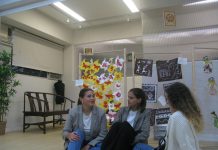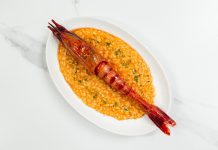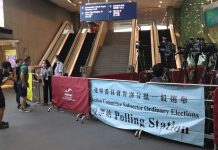Tapping into Hong Kong’s niche handmade instrument market
By Raven Hui & Civi Yap













Warm yellow light from a table lamp illuminates Corvus Kwok’s work desk. He pulls out a half-crafted violin body, running his fingers over its smoothed wooden surface and pondering the whole design.
He is facing a wall covered in bending irons, sharp knives, dial callipers, peg shavers and other violin-making tools, some of which he has used since he first started learning the craft. With a potential design in mind, he grabs a couple of f-hole drills and starts working around the pencil marks on the violin. This is Kwok’s daily routine, the highly skilled craft he practises at his studio in an industrial building in San Po Kong.
The 29-year-old had an uphill struggle at the start of his career since there was no local institution to teach him the necessary skills. After graduating from Hong Kong Baptist University with a degree in music, he drew out his savings and set out to learn violin making at the Shanghai Conservatory of Music. Later, he furthered his studies with top-notch violin artisan Michael Darnton in the United States. Now, Kwok is one of the few well-known violin makers in Hong Kong and the results of his work are available at instrument retailers, such as National Strings.
“There is no perfect violin in the world, just like no one is perfect,” Kwok says. Violin making, he explains, is not about replicating a million-dollar Stradivarius, it is about making sure every violin has a unique character. “Even though violins share a standard structure, wood pieces — unlike plastic — have their own characteristics, and the arcs you make out of them always differ,” he says. “We have to strive beyond precision.”
Since there are only a few local instrument makers in Hong Kong, Kwok says most people have no idea about the quality of locally crafted instruments. “The determining factor in an instrument’s quality is not whether it is made locally or overseas, but whether it is made well or not. There could be good ones made in Hong Kong and bad ones imported from overseas,” he adds.
Unlike Kwok, who received formal training in institutions outside Hong Kong, the founder of drum studio Drum Map, Ho Yat-kwan, 55, and his partner Rex Lau Kwok-wah, 40, acquired their skills by trial and error. Ho and Lau, who became friends through their mutual obsession with drumming, started disassembling and reassembling old drums seven years ago out of sheer curiosity. “It’s a relatively new industry here but not overseas. We’ve been learning from foreign drum makers via the internet,” says Ho.
All local instrument makers have to struggle to get a stable supply of raw materials and Ho and Lau are no exception. “It is quite hard to negotiate with the suppliers because they don’t want to entertain us. They always question our production volume,” Ho says. Besides, machines and tools for making drums are rare in the city. Lau says: “In Hong Kong, there are no tools specifically designed for making drums, so we had to invent suitable ones ourselves.” Their studio is now filled with machines they have perfected over the years.
Large chain retailers, like Tom Lee Music, sell mainly imported instruments from big brands but they have begun to welcome locally made instruments in recent years. Ho and Lau were invited to display their handmade drums in Tom Lee Music’s shop in Tsim Sha Tsui, and some of them were eventually purchased by foreign drummers.
Now, the duo’s ideal is not to sell their drums solely for money, but also to musicians who share their enthusiasm. They notice that artists in the local music industry have become more inclined to use locally crafted instruments than the big brand ones. Playing good music, according to Ho, does not only depend on the brand or quality of an instrument. It is about “half the player, half the drum”. “Our drums cannot make their players play well—they have to play well per se. Only then can our drums help them unleash their potential to the fullest,” explains Lau.
Sha, who prefers to go by his nickname, was a pioneer in the local artisan guitar industry more than two decades ago. His masterpiece, he says, was the flame-shaped electric guitar played by famous local singer Nicholas Tse Ting-fung at his Viva Live concert in 2000. The guitar maker’s interest in the craft started when he was only 16. He went on to handcraft guitars in Australia, Europe, the US, Japan and then Hong Kong. Now, the 32-year-old has his own guitar factory and his instruments are available at Sha Instruments in Chai Wan.
Sha thinks that the local instrument retail industry is changing. “The business has been transforming into a direct sales model from a retail model, as the price range of direct sales is more affordable,” he says. Building brand loyalty is very important for independent sellers like Sha. “If you set a good standard with your brand, people will refer to your standard. Then you can go on building your brand slowly. Eventually people will know and accept your brand,” he says.
“10 to 20 years ago, Hongkongers had little idea of handmade instruments,” he says, “but now, they know more and understand what makes instruments high-quality.” Sha believes that those looking for custom-made guitars are people who already have their own notion of what makes a good guitar. “The instruments speak for themselves,” says Sha. “For those who want to explore their dreams, I’ll help them make dreams happen [with my guitars].” Sha only makes around 30 guitars a year, so each of them is one of a kind.
In the future, Sha plans to explore the possibility of improving production by using computer technology. He will keep handcrafting guitars, but hopes that his new, automated branch will improve the production rate and add to his profit. “[My idea is that] after entering the formulas, the machine will carve out the guitar body precisely, making the production process more efficient and accurate,” he says.
Like Kwok, Lau and Ho, Sha is one of the few independent instrument makers in Hong Kong who built their careers from scratch. He thinks that the government should lend more support to craft-based businesses such as his by organising cultural market fairs and providing more venues for culture and art activities. “I hope that eventually the makers won’t have to advertise for themselves all the time.”
Edited by Angela Ng & Angela Siu








































